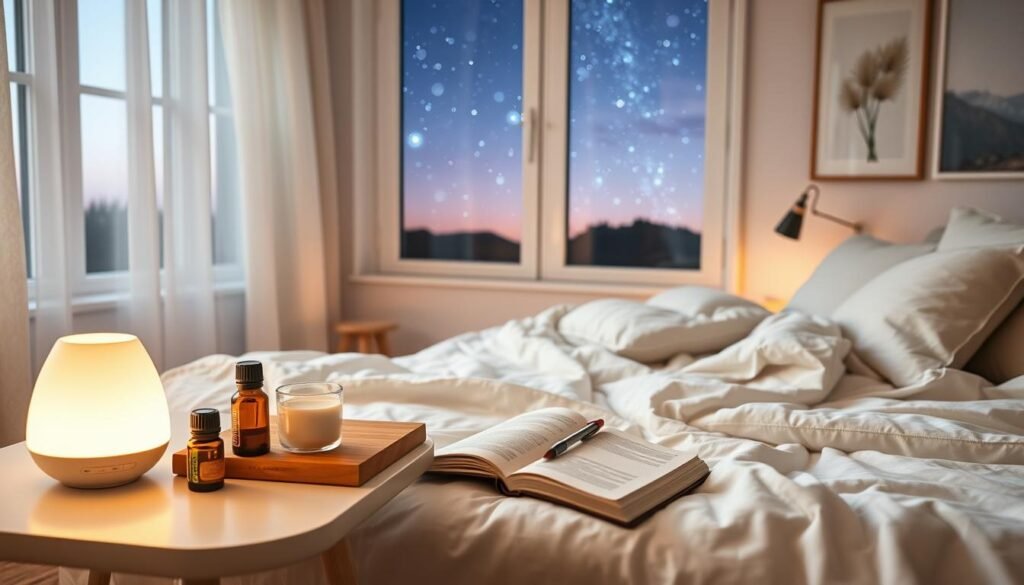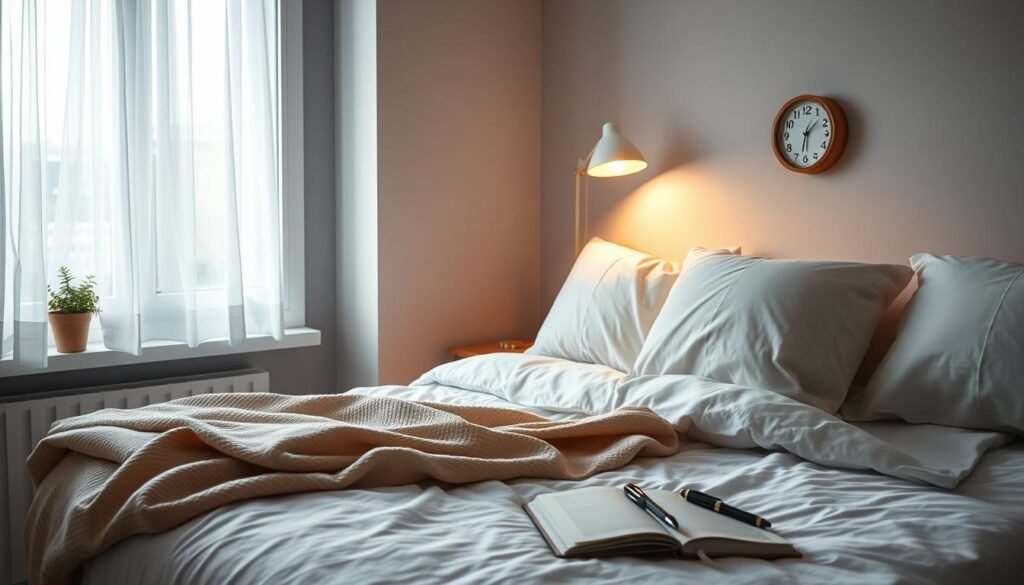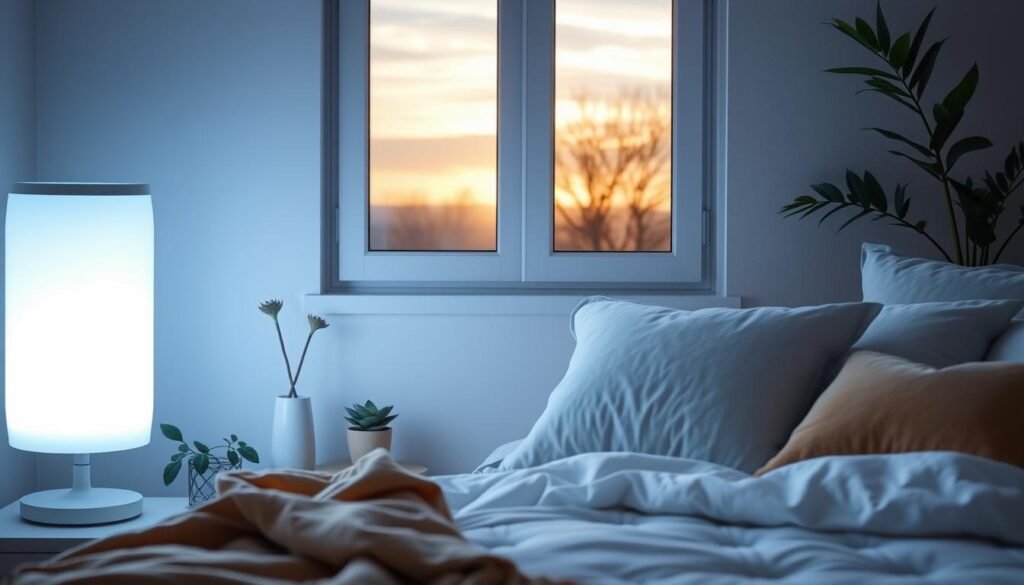Did you know that about 50% of COVID survivors still have sleep problems? Insomnia is what they often struggle with. This article will talk about how to deal with “COVIDsomnia.” We’ll see how it messes with sleep and well-being. We’ll explore treatments like cognitive behavior therapy and mindfulness. These can help people sleep better again.
Key Takeaways
- Long COVID insomnia affects nearly half of those recovering from the virus.
- Effective treatment strategies can improve symptoms within a week.
- Cognitive behavioral therapy is a primary treatment for insomnia.
- Structural brain changes can lead to sleep disturbances.
- Psychological issues related to long COVID may exacerbate insomnia.
- Establishing good sleep hygiene practices is crucial for better sleep quality.
What is COVID-Related Insomnia?
COVID-related insomnia, or COVIDsomnia, involves sleep problems that appeared during the pandemic. It is now widely acknowledged as a big problem. Many people who have had COVID-19 suffer from it.
COVIDsomnia includes trouble falling asleep, staying asleep, frequent wake-ups, and feeling unrested. These issues make it hard for people to get a good night’s sleep.
Understanding the Symptoms of COVIDsomnia
About 52% of people with long COVID have trouble sleeping. For most, this means insomnia. The common signs are:
- Nights filled with frequent awakenings
- Vivid nightmares or disturbing dreams
- Daytime fatigue and reduced cognitive performance
- Restless and unsatisfactory sleep
These issues harm both body and mind. They lead to more stress and feelings of depression.
How Insomnia Differs from Other Sleep Disorders
COVID-related insomnia is different from other sleep issues. It means having hard times sleeping at least three nights a week for over three months. Other conditions, like sleep apnea or restless legs syndrome, have different causes and signs.
What makes COVIDsomnia unique is its link to the pandemic’s effects on the brain and stress levels. Treating insomnia is crucial to avoid more serious health problems, including heart and metabolism issues.
How Long COVID Affects Sleep Patterns
Long COVID significantly impacts sleep quality. People experience different sleep pattern disturbances that can last a long time. Many who had COVID-19 suffer from insomnia and similar symptoms. It’s important to understand how long COVID changes sleep to manage these issues.
The Prevalence of Insomnia Among Long-Haulers
About 40% of long COVID sufferers have sleep problems, including insomnia. This affects their everyday life. Neuro-PASC patients, up to 85%, feel extreme fatigue, and a third have insomnia. Sleep issues are common among those recovering from COVID-19. Over half of those infected have reported sleep difficulties. This shows how widespread these problems are among long-haulers.
Daytime Symptoms Related to Insomnia
Insomnia affects not just night rest but also causes daytime issues. People with long COVID often feel tired, can’t focus, and are sleepy during the day. These symptoms are due to not getting enough restful sleep. They harm cognitive skills and life quality. Lack of deep sleep, often due to long COVID, hurts memory and concentration. It is crucial for those affected to find ways to better their sleep patterns.
Causes of Long COVID Insomnia
Long COVID insomnia’s roots can be found in how our brains and mental health interact. Studies have shown that the changes in the brain’s structure can reduce sleep quality. This is particularly true for those recovering from COVID-19.
Direct Changes to Brain Structure
MRI scans have revealed changes in brain structure in long COVID sufferers. These changes happen in brain parts that control our sleep cycles. This can mess up how well we sleep. For example, out of people with mild COVID-19 in the past six months, 76% struggled with insomnia. In this group, 22.8% had severe insomnia. This shows a strong connection between COVID-19 and ongoing sleep issues.
Impact of Psychological Issues on Sleep
Anxiety and depression are big factors in causes of long COVID insomnia. A study in 2022 found that 37% of people around the world had sleep problems due to the pandemic. Those with higher depression were over 3 times more likely to have insomnia. People with a lot of anxiety were almost 4 times more at risk. This tells us that our mental well-being is key in dealing with sleep troubles.
Half of those with insomnia said they wake up a lot at night. This points out how closely sleep quality and mental health are linked.
Long COVID Insomnia Treatment Options
Combating insomnia in long COVID sufferers involves various effective treatments. These methods can help enhance sleep and boost health. It is crucial to explore innovative, non-medicated therapies.
Therapeutic Approaches without Medication
Non-medicated techniques are key for dealing with long COVID insomnia. Keeping a regular sleep schedule can greatly improve sleep. Also, having a soothing nighttime routine with relaxation methods can make falling asleep easier.
Cognitive Behavioral Therapy for Insomnia (CBT-I)
Cognitive behavioral therapy is a strong choice for those with insomnia from long COVID. It changes how patients think about sleep, easing bedtime worries. Research shows CBT-I helps many, even through online sessions. This makes it a widely available option for sufferers.
Treating insomnia early is critical to avoid worsening symptoms. A study shows over 25% of COVID recoverees report sleep issues. More on this can be found in this recent article.

Medication for Long COVID Insomnia: Pros and Cons
Medication for insomnia can be a temporary fix for those with long COVID sleep issues. Patients often look at the pros and cons. Some meds may help you fall asleep faster, but they also have risks.
It’s important to talk with healthcare providers. They can help you choose the best options for you.
Common Medications Used
Several insomnia meds are often given for long COVID sleep problems. Some examples are:
- Z-Drugs (e.g., zolpidem, eszopiclone) – They help you fall asleep quickly.
- Benzodiazepines (e.g., lorazepam, diazepam) – They can lessen anxiety and make sleep better.
- Melatonin – It adjusts sleep cycles with few side effects.
- Antidepressants (e.g., trazodone) – They are good for those with insomnia and mood problems.
Potential Side Effects and Dependency Risks
These meds can work well, but they also have side effects and addiction risks. Some common side effects are:
| Medication Type | Common Side Effects | Dependency Risks |
|---|---|---|
| Z-Drugs | Daytime drowsiness, dizziness, memory problems | High |
| Benzodiazepines | Confusion, dry mouth, sleepwalking | Very High |
| Melatonin | Nausea, headache, mild irritability | Low |
| Antidepressants | Blurred vision, constipation, dizziness | Moderate |
Patients should be careful about addiction, especially with benzodiazepines and z-drugs. Talking to healthcare professionals can help. They can guide you through the treatment options, weighing risks and benefits.
Sleep Hygiene Techniques to Enhance Sleep Quality
Good sleep hygiene is key for better sleep, especially if you’re dealing with long COVID insomnia. Simple changes in daily habits can make a big difference. They help create a better sleep environment and routine.
Establishing a Consistent Sleep Schedule
Having a regular sleep schedule helps your body’s clock. It makes falling asleep and waking up easier. Try to go to bed and wake up at the same time every day, even on weekends. This improves your sleep quality.
You should also stay away from caffeine before bed. It can keep you awake for up to 12 hours. Getting into a routine is more important. The pandemic has messed up many people’s sleep schedules.
Creating a Relaxing Bedtime Routine
It’s important to have a calming bedtime routine to get ready for sleep. Activities like reading, meditation, or a warm bath can relax you. Staying away from screens before bed helps keep your melatonin levels right for sleep.
Also, make your sleep space cool, dark, and quiet for the best rest. Small changes like these really improve your sleep quality.

Mindfulness and Relaxation Techniques
For those battling insomnia, especially from long COVID, mindfulness and relaxation are key. They lead to better overall health. By focusing on mindfulness meditation, stress decreases. This creates a calm mind, helping with better sleep.
How Mindfulness Meditation Can Help
Mindfulness meditation before bed has many benefits. It soothes anxious thoughts and lessens pre-sleep worry. Research shows it may even reduce inflammation related to post-COVID symptoms.
These methods also boost focus and stabilize emotions. This makes winding down easier after a busy day.
Incorporating Relaxation Exercises into Your Day
Daytime relaxation exercises can cut down on anxiety and tiredness. This results in better sleep. Techniques such as deep breathing or muscle relaxation fit into daily life well. They help control stress.
These exercises have greatly helped long COVID sufferers sleep better. For tips on managing insomnia, check out various methods, including mindfulness and relaxation exercises designed for improved rest.
Light Therapy and Sleep Restriction Therapy
Those dealing with insomnia from long COVID have hope. Light therapy and sleep restriction therapy are two effective options. They help improve sleep quality and health.
The Benefits of Light Therapy for Insomnia
Light therapy can help with insomnia. It involves bright light exposure in the morning. This resets circadian rhythms, improving sleep and alertness.
Benefits also include better mood and energy. It’s great for long COVID patients with disrupted sleep cycles.
Understanding Sleep Restriction Therapy
Sleep restriction therapy helps by limiting bed time. It might sound odd, but it strengthens the sleep-bed connection. Studies show it reduces insomnia and improves sleep.
It works better than some self-help methods. It’s a top option for those with insomnia from long COVID.

Anti-Anxiety Medications and Their Role in Treating Insomnia
Handling insomnia usually requires more than one strategy, especially when anxiety is involved. Anti-anxiety meds can be a big help for folks struggling to sleep because of their anxiety. These drugs calm panic attacks and cut down anxiety, leading to better sleep. But it’s important to think about the long-term effects of using them.
When to Consider Medication
Medication might be necessary when someone’s anxiety is constant and ruins their sleep. Drugs like Estazolam and Quazepam can improve sleep for those with COVID-19, avoiding drug interaction issues. Other options, like Zolpidem, boost sleep without many risks. But, everyone’s situation is different, so what works for one person might not work for another.
Balance Between Natural and Medicinal Treatments
Effective treatment plans should mix medicinal and natural remedies. Medicine offers quick relief from anxiety, while natural methods like mindfulness help in the long run. Techniques such as cognitive behavioral therapy (CBT) also improve sleep without meds. Teaming up with a healthcare provider helps find the right balance to beat insomnia.
| Medication Type | Examples | Benefits | Risks |
|---|---|---|---|
| Benzodiazepines | Estazolam, Quazepam | Improve sleep quality, reduce anxiety | Potential dependency, respiratory complications |
| Nonbenzodiazepines | Zolpidem, Eszopiclone | Effective for immediate sleep onset | Risk of infection, potential for addiction |
| Orexin Receptor Antagonists | Suvorexant | Addresses insomnia effectively | Associated with respiratory risks |
| Antidepressants | Doxepin | Helps with sleep maintenance | Risk of respiratory issues, other complications |
For more details on insomnia and its connection to anxiety, read this detailed study.
Conclusion
Treating long COVID insomnia needs a plan that includes lifestyle changes, help from therapy, and sometimes medicine. It’s key to understand the complex issues with sleep to improve health. Studies show that sleep problems before COVID-19 make COVID outcomes worse. This underscores the importance of focusing on sleep for long COVID recovery.
Getting help is crucial for those dealing with insomnia from long COVID. Therapies like Cognitive Behavioral Therapy for Insomnia (CBT-I) help a lot. Also, joining support groups and trying self-help tips are important steps. These help improve your sleep and life quality. It’s good to check out different ways to find peace and good sleep.
Knowing both the mental and physical sides of sleep problems helps in treating long COVID insomnia. Better sleep doesn’t just help recovery; it also boosts how well you function and feel daily. As more people learn about these issues, they can find better sleep solutions. This leads to a healthier, happier life.